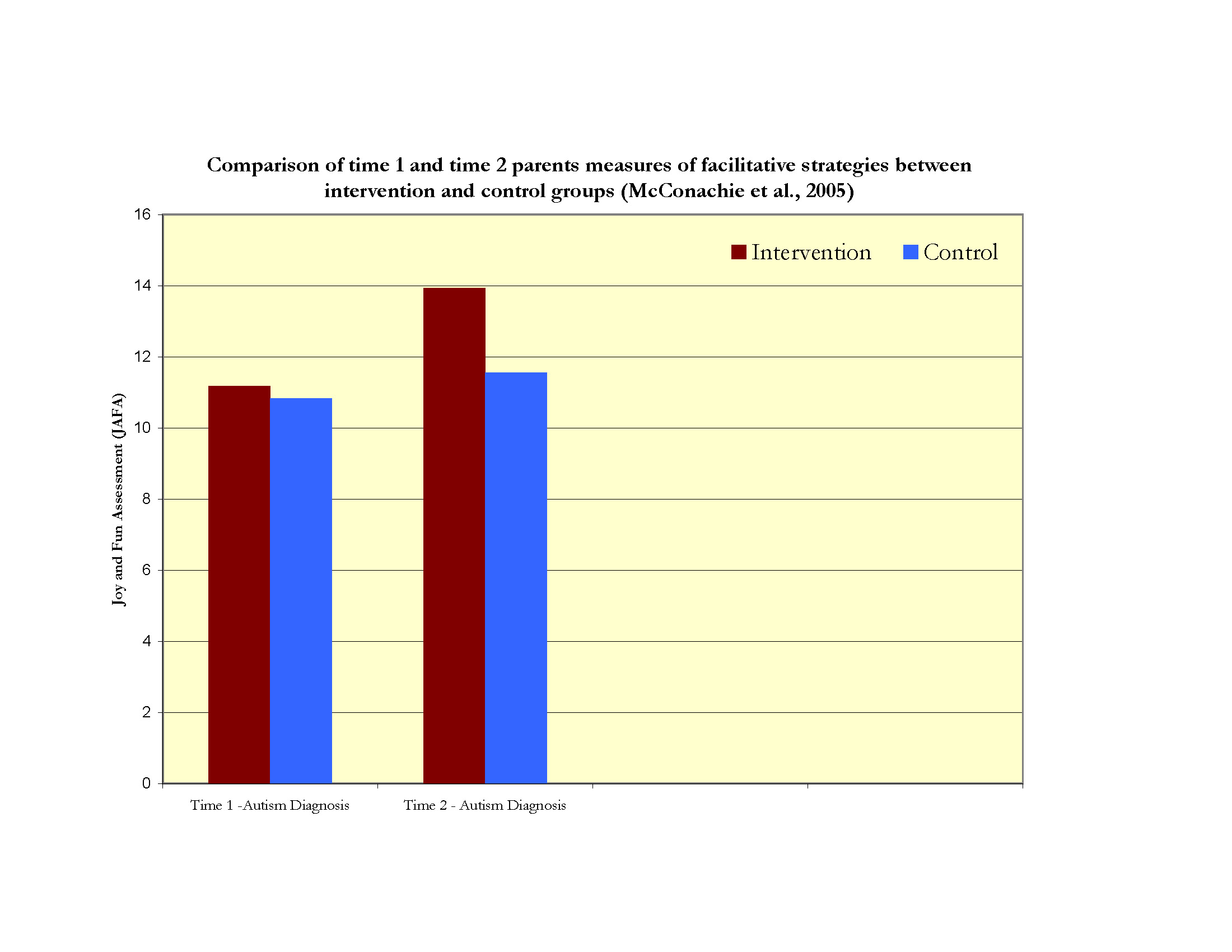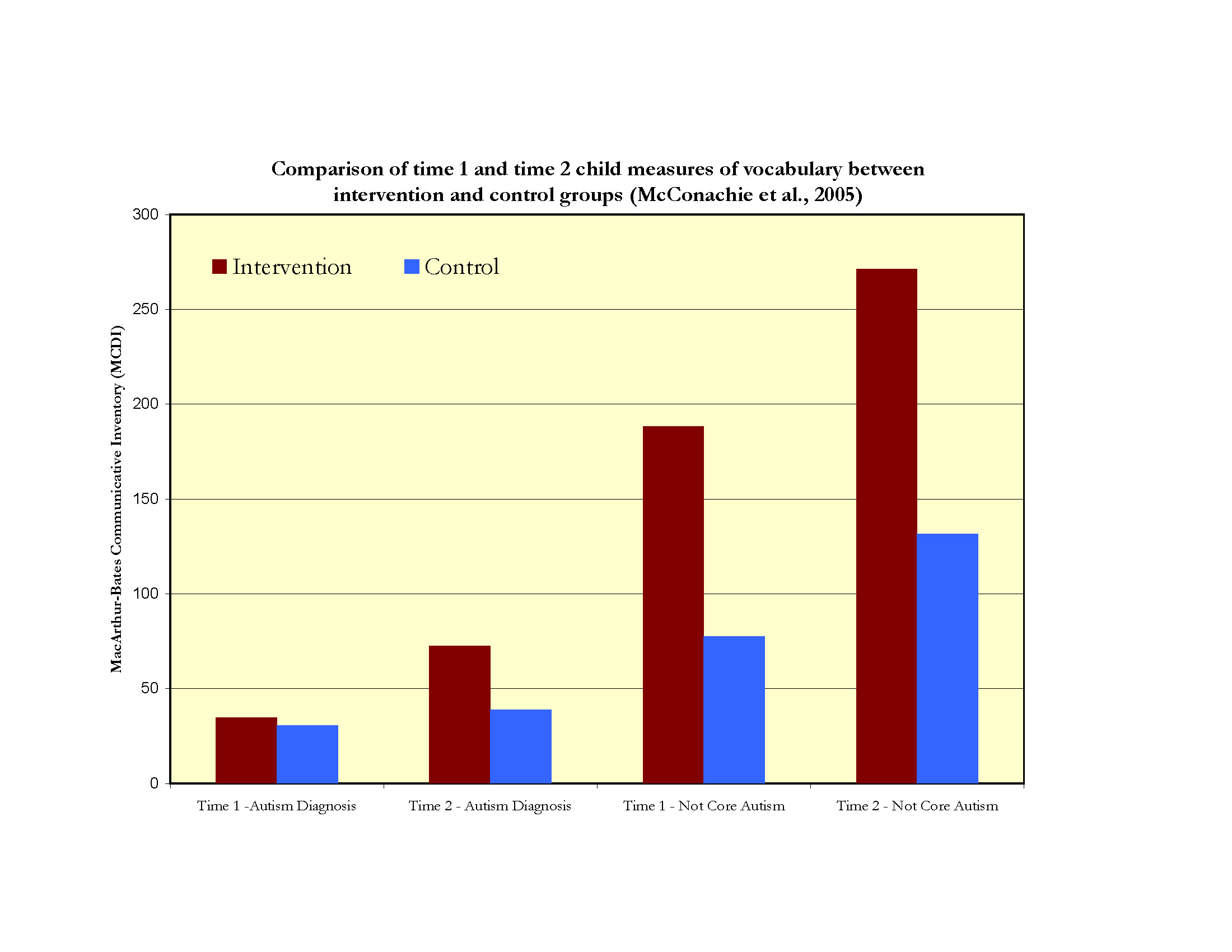More Than Words® Study 11
A Controlled Trial Comparing the Outcomes for Parents and Children Resulting from Parents’ Participation in a More Than Words® Program
(McConachie , Randle, & Le Couteur, 2005)
Area of Investigation
The study was conducted in order to determine whether:
- Parents who attend a More Than Words Program:
- Use more facilitative interaction strategies;
- Are less stressed than parents who have not attended this program.
- Children whose parents attend a More Than Words Program:
- Have better language and communication skills;
- Have fewer behaviour problems
than those whose parents have not attended this program.
Research Design and Subjects
This quasi-experimental study compared the outcomes of preschool-aged children with ASD or suspected ASD and their parents (49 mothers and two fathers), who attended a More Than Words Program under two conditions:
- Shortly after recruitment (immediate intervention)
- When a program became available after the child’s difficulties had been identified (delayed control)
The design made use of a naturally occurring control group.
Subjects: 51 preschool-aged children (24 – 48 mos) with ASD or suspected ASD.
Intervention group: 26 children, 17 diagnosed with autism (ASD), 9 not core autism (NCA - did not meet all criteria for diagnosis of core autism).
Control group: 25 children, 12 diagnosed with autism, 13 not core autism.
Outcome measures were administered at recruitment (time 1) and approximately 7 months later (time 2), which was 4 months post-program.
Intervention
Parents attended the More Than Words Program, with each family receiving:
- 20 hours of instruction in eight parent training sessions in groups of eight families
- three home visits (for parent and child) to monitor their progress and provide individualized coaching using videotaping and feedback
Results
Increase in parent responsiveness
Parents in the intervention group scored significantly higher on the JAFA than parents in the control group, when their children had a positive diagnosis of autism. Parents of children without a confirmed diagnosis of autism (NCA – not core autism) did not change significantly relative to the control group, raising the possibility that the impact of More Than Words is “. . . greater for parents of children with core autism, where the strategies introduced are particularly empowering, after they have struggled to capture the attention of their child, have found their child’s self-directed behaviour hard to interpret as communication and so may have felt unable to interact or play with their child” (McConachie et al., 2005, p. 339).
Increase in child vocabulary
A significant difference was found between the experimental and control groups in terms of children’s vocabulary size, as measured by parental report on the MacArthur-Bates Communicative Development Inventory (CDI).
Social Communication Skills, Child Behaviour and Parental Stress
Social communication skills as measured by the Autism Diagnostic Observation Schedule (ADOS) did not differentiate between the two groups of children at post-test. However, it is feasible that the study did not use sufficiently sensitive measures of dyadic interaction to examine outcomes in children’s joint engagement (Girolametto et al., 2007). There were no significant differences for child behaviour or parental stress between the two groups.
Summary
This study had two key findings:
- Parents are able to learn and apply the interaction strategies that are likely to facilitate their child’s communication development, especially when the child has a confirmed diagnosis of autism
- The children whose parents attended More Than Words had larger reported vocabularies, regardless of whether they had confirmed or non-confirmed autism
These results provide preliminary evidence that More Than Words may positively impact parent-child interactions and early language skills in autistic children.


